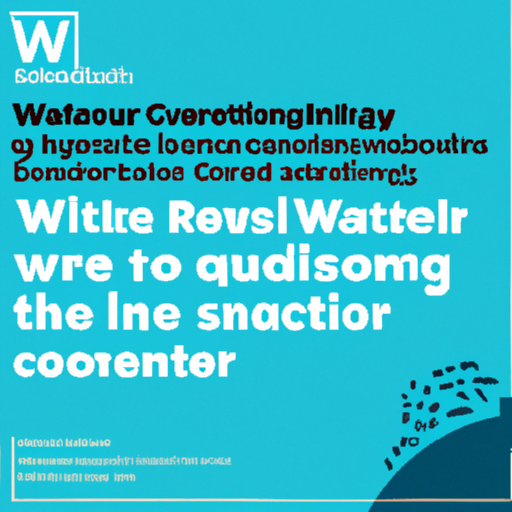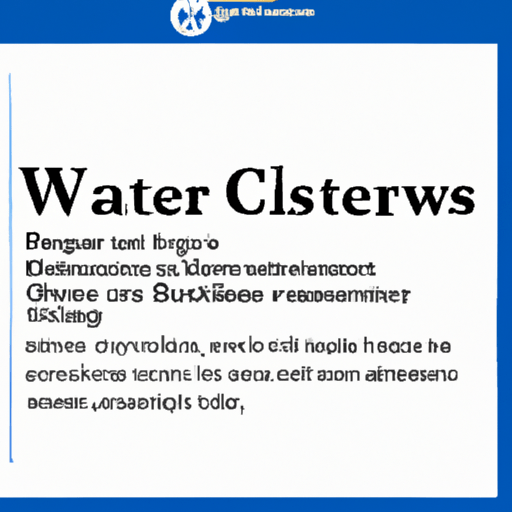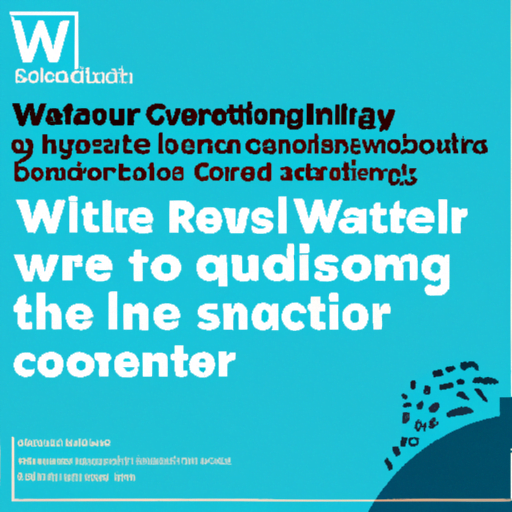Are you interested in off-grid living? Have you ever wondered how much water you need for survival in such a lifestyle? Well, look no further because in this article, we will discuss water conservation tips specifically tailored for off-grid living. Whether you are a seasoned off-grid enthusiast or just starting out, these tips will help you make the most of your limited water supply.
Living off the grid means being completely self-sufficient, and water is an essential resource that cannot be taken for granted. The amount of water you need for survival varies depending on factors like climate, lifestyle, and personal hygiene habits. However, a rough estimation is that an adult needs at least one gallon of water per day for drinking and cooking alone.
Now, let’s dive deeper into the topic of water conservation in off-grid living. We will explore various strategies to help you conserve and manage your water supply effectively, such as rainwater harvesting, greywater recycling, low-flow fixtures, and water-efficient appliances. These methods can not only help you reduce your water usage but also save money and contribute to a more sustainable way of living.
In this article, we will provide detailed information and practical tips on each water conservation method, explaining how they work and the steps you can take to implement them in your off-grid lifestyle. So, if you want to learn more about how to make the most of your limited water supply and ensure a sustainable future, keep reading!

Tips for Water Conservation in Off-Grid Living
Off-grid living offers a sense of freedom and self-sustainability that many people find appealing. It allows you to live independently, relying on renewable energy sources and minimizing your carbon footprint. However, one of the biggest challenges of off-grid living is managing your water supply. In this article, we will explore the importance of water conservation in off-grid living and provide you with useful tips on how to optimize your water usage.
Understanding the Concept of Off-Grid Living
Off-grid living refers to a lifestyle that does not rely on public utilities such as electricity, water, or sewage systems. Instead, off-grid homeowners generate their own power through renewable energy sources like solar panels or wind turbines and collect and store their own water. This self-sufficiency allows them to live independently and reduces their impact on the environment.
Advantages and Challenges of Off-Grid Living
Living off-grid has several advantages. Firstly, it grants you freedom from utility bills and the reliance on public infrastructure. You have control over your energy usage and can reduce your environmental impact. However, it also comes with its challenges, such as managing water supply. Unlike those connected to the municipal water system, off-grid individuals must carefully monitor and conserve water.
Determining Water Needs in Off-Grid Living
Calculating your water needs is crucial to ensure you have enough supply for daily use. Several factors must be taken into consideration, such as the number of individuals in your household, climate, and your lifestyle. On average, experts recommend allocating 1-2 gallons of water per person per day for drinking, cooking, and hygiene purposes.
Implementing Water Conservation Strategies
To make the most out of your limited water supply, incorporating water conservation strategies is necessary. Rainwater collection is an excellent way to augment your water supply. By setting up a rainwater harvesting system, you can collect rainwater and store it in tanks or barrels for future use.
Using water-efficient appliances and fixtures, such as low-flow showerheads and dual-flush toilets, can significantly reduce water consumption. Another effective strategy is implementing greywater recycling systems. Greywater, which is the wastewater from sinks, showers, and washing machines, can be treated and reused for irrigation purposes.
Practicing responsible irrigation techniques in your garden is another way to conserve water. For instance, drip irrigation systems deliver water directly to the plants’ roots, minimizing wastage. Regularly inspecting your plumbing for leaks and fixing them promptly is also essential for water conservation.
Optimizing Water Usage in Daily Activities
You can further optimize your water usage by adopting efficient techniques in your daily activities. When washing dishes or doing laundry, make sure to fill the sink or washing machine to its capacity before starting. This avoids unnecessary water wastage. Additionally, consider using natural detergents that require less water for rinsing.
Shortening your shower time and installing low-flow showerheads can lead to significant water savings. When gardening or landscaping, choose drought-resistant plants and mulch the soil to retain moisture. In the kitchen, consider using a basin to wash fruits and vegetables, which can later be used to water plants.
Promoting Water Conservation Awareness
Water conservation is not only crucial for off-grid living but also for everyone’s sustainability. By educating community members and neighbors about the importance of water conservation, you can make a collective impact. Organize workshops or information sessions to share tips and techniques for water conservation.
Engaging in water-saving initiatives, such as community gardens or water conservation campaigns, can foster a sense of teamwork and contribute to a more sustainable future. In the age of social media, you can also use platforms like Facebook or Instagram to share water conservation tips with a wider audience.
Incorporating Alternative Water Sources
While rainwater collection is a great alternative, exploring other water sources can provide additional security. Utilizing well water or underground springs can provide a constant supply of water. However, it is essential to ensure that these water sources are properly tested and treated for consumption.
For those living in coastal areas, desalination can be a viable option. Desalination is the process of removing salts and minerals from seawater to make it safe to drink. Although it can be expensive and energy-intensive, advancements in technology have made it more accessible for off-grid individuals.
In cases where natural water sources are limited, considering water delivery services can provide a reliable backup plan. These services transport water to your property in bulk, ensuring you have access to clean water during water shortages or emergencies.
Managing Water Storage and Filtration Systems
When it comes to off-grid living, proper management of your water storage and filtration systems is crucial. Choosing appropriate water storage containers, such as food-grade plastic or stainless steel tanks, helps maintain the water’s quality and prevents contamination. Regularly inspect and clean your storage containers to ensure the water remains fresh and safe for consumption.
Monitoring water quality is equally important. Utilize water filters and treatment methods to remove any impurities and ensure your water is potable. Regularly test your water for contaminants and invest in a reliable filtration system that suits your needs.
Prioritizing Basic Hygiene and Sanitation
Maintaining proper hygiene and sanitation is essential for your health and wellbeing. Ensure access to clean water for personal hygiene by storing enough water for bathing, toothbrushing, and handwashing. Implement proper waste disposal methods to prevent contamination of your water sources. Regularly clean and sanitize your living areas to minimize the risk of diseases caused by poor sanitation practices.
Planning for Water Shortages and Emergencies
Preparing for water shortages and emergencies should be a part of your off-grid living plan. Create contingency plans for water scarcity by understanding the available water sources in your area and identifying backup options. Stockpile emergency water supplies, such as bottled water or water purification tablets, to ensure you have enough water during unexpected situations. In regions prone to extended drought periods, investing in large water storage systems could be beneficial.

Conclusion
Water conservation is a critical aspect of off-grid living. By understanding your water needs, implementing conservation strategies, and optimizing water usage, you can live in a sustainable and self-sufficient manner. It is essential to prioritize responsible water usage, promote awareness within your community, and explore alternative water sources. By taking these steps, you can make a positive impact on the environment and ensure a secure water supply for yourself and future generations.




